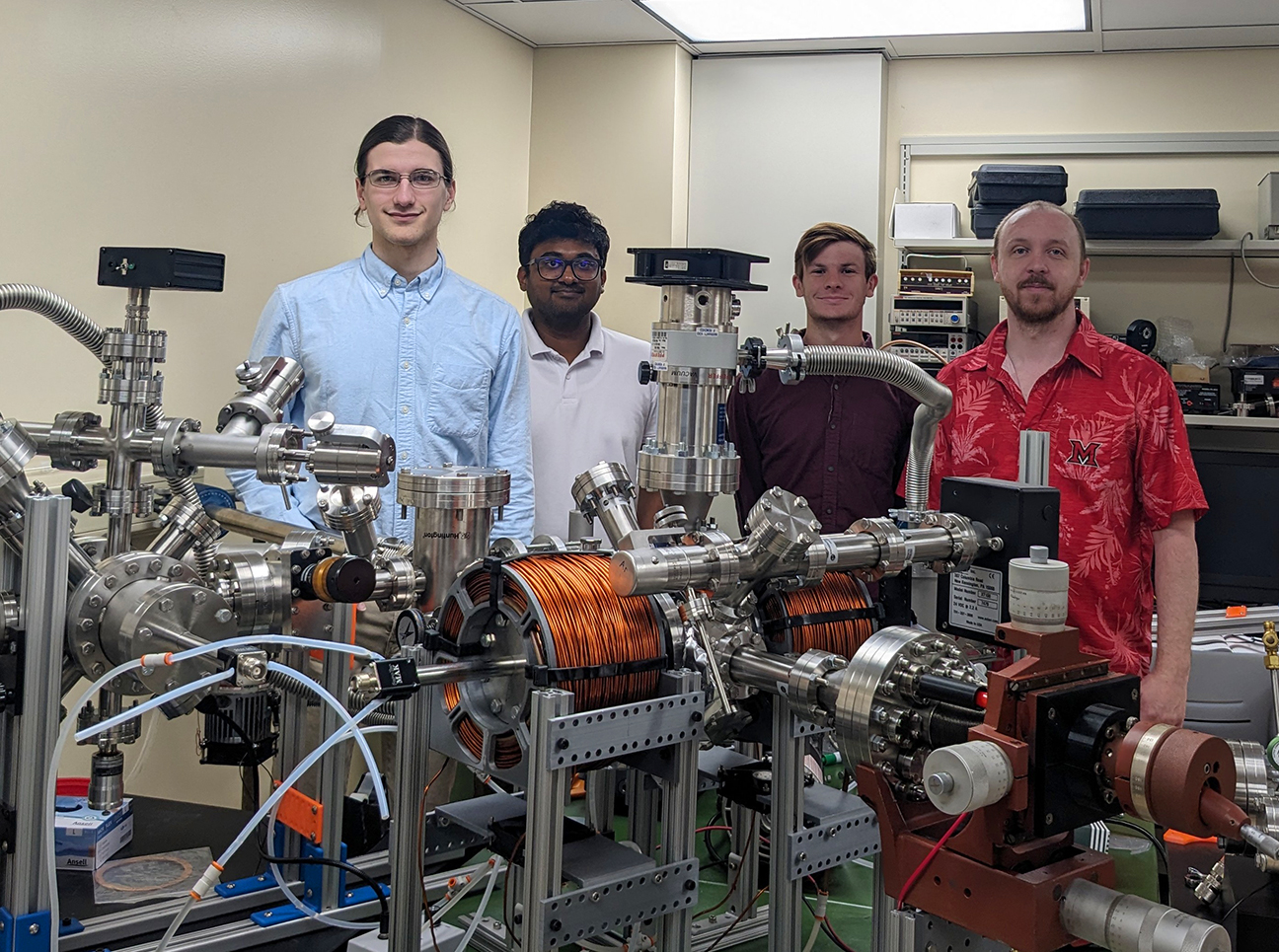WRIGHT-PATTERSON AIR FORCE BASE, Ohio (AFRL) – The Air Force Research Laboratory, or AFRL, recently signed an Educational Partnership Agreement with Miami University in Oxford, Ohio, to donate an ultra-high vacuum scanning tunneling microscope, or UHV STM, to the Corbett Research Group led by Dr. Joseph Perry Corbett, an assistant professor of physics at Miami University. Prior to joining Miami University, Corbett worked as a research scientist with AFRL’s Agile Electronics Team.

From left: Miami University students Carter Wade, Lakshan Don Manuwelge Don, Nate Price and Dr. Joseph Perry Corbett, test the newly installed ultra-high vacuum scanning tunneling microscope at Miami University in Oxford, Ohio on, May 30, 2024. The microscope was donated by the Air Force Research Laboratory Materials and Manufacturing Directorate to the Corbett Research Group as part of a recently signed Educational Partnership Agreement with Miami University. Corbett, who leads the group, is an assistant professor of physics at Miami University, and is a former AFRL materials research scientist. (Courtesy photo / Rannet Manning)
Jeremy Gratsch, technology transfer and partnerships lead for AFRL’s Materials and Manufacturing Directorate, said when a piece of research equipment is retired, they try to find an educational institution that can put it to good use within their own programs.
“AFRL uses these agreements to provide students additional access to state-of-the-art equipment with the hopes of educating and inspiring the future STEM workforce,” said Gratsch. “We hope this will also get students thinking about science and technology careers with the Air Force, and possibly with AFRL.”
As part of his work with AFRL, Corbett characterized thin-film materials used to create optical sensors, that utilized polarized light, which could detect visually camouflaged man-made objects.
“The Corbett Research Group employs a wide breadth of individuals at various stages of preparation for the workforce,” said Corbett. “The instrumental techniques and scope of the research prepare individuals with a strong background in hands-on, state-of-the-art experimental techniques in materials growth, device fabrication and micro-to-atomic scale measurement.”
With the growth and microscopy techniques fully customizable, the students and postdoctoral researchers learn to develop a strong synergy between experimental design, execution and state-of-the-art metrology, or the study of measurement.
According to Corbett, the group specializes in next-generation materials research that exploits special quantum mechanical phenomena within materials to help bring about the quantum revolution in various technological fields. Materials such as these will enhance the ability to make ultra-fast computers and GPS denied navigation, as well as detect new levels of brain activity and camouflaged objects.
“The research group characterizes these quantum materials using special microscopes that enable the team to take pictures of the material and probe the quantum mechanical phenomena down to the level of a single layer of atoms,” said Corbett. “The UHV STM donated by AFRL will push the group’s microscope cadre to the next level of research capability by enabling them to take pictures of individual atoms and probe the quantum mechanical phenomena at the atomic level.”
The Corbett Research Group maintains a strong working relationship with AFRL, helping to develop novel quantum materials with technological goals that advance the readiness and mission of the Department of the Air Force and its national defense interests.
Working closely with Back and AFRL materials researcher Dr. Kurt Eyink, Corbett spent 12 weeks in 2023 as a Summer Faculty Fellow with AFRL’s Materials and Manufacturing Directorate, investigating quantum materials similar to those he developed during his AFRL tenure. This collaborative research effort is currently being prepared for a peer-reviewed publication.
Additionally, Corbett has invited multiple AFRL researchers to Miami University to give a colloquium on their research and help foster workforce pipelines to AFRL. Because of this continued connection, Corbett’s students are afforded opportunities to further enhance their STEM training in real-world research scenarios.
About AFRL
The Air Force Research Laboratory is the primary scientific research and development center for the Department of the Air Force. AFRL plays an integral role in leading the discovery, development, and integration of affordable warfighting technologies for our air, space and cyberspace force. With a workforce of more than 12,500 across nine technology areas and 40 other operations across the globe, AFRL provides a diverse portfolio of science and technology ranging from fundamental to advanced research and technology development. For more information, visit: www.afresearchlab.com.

